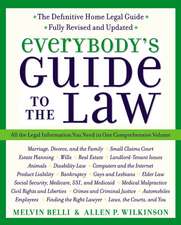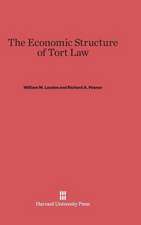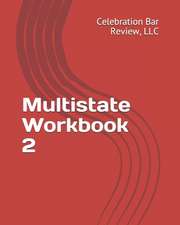Uncommon Sense: Economic Insights, from Marriage to Terrorism
Autor Gary S. Becker, Richard A. Posneren Limba Engleză Paperback – 15 sep 2010
On December 5, 2004, the still-developing blogosphere took one of its biggest steps toward mainstream credibility, as Nobel Prize–winning economist Gary S. Becker and renowned jurist and legal scholar Richard A. Posner announced the formation of the Becker-Posner Blog.
In no time, the blog had established a wide readership and reputation as a reliable source of lively, thought-provoking commentary on current events, its pithy and profound weekly essays highlighting the value of economic reasoning when applied to unexpected topics. Uncommon Sense gathers the most important and innovative entries from the blog, arranged by topic, along with updates and even reconsiderations when subsequent events have shed new light on a question. Whether it’s Posner making the economic case for the legalization of gay marriage, Becker arguing in favor of the sale of human organs for transplant, or even the pair of scholars vigorously disagreeing about the utility of collective punishment, the writing is always clear, the interplay energetic, and the resulting discussion deeply informed and intellectually substantial.
To have a single thinker of the stature of a Becker or Posner addressing questions of this nature would make for fascinating reading; to have both, writing and responding to each other, is an exceptionally rare treat. With Uncommon Sense, they invite the adventurous reader to join them on a whirlwind intellectual journey. All they ask is that you leave your preconceptions behind.
In no time, the blog had established a wide readership and reputation as a reliable source of lively, thought-provoking commentary on current events, its pithy and profound weekly essays highlighting the value of economic reasoning when applied to unexpected topics. Uncommon Sense gathers the most important and innovative entries from the blog, arranged by topic, along with updates and even reconsiderations when subsequent events have shed new light on a question. Whether it’s Posner making the economic case for the legalization of gay marriage, Becker arguing in favor of the sale of human organs for transplant, or even the pair of scholars vigorously disagreeing about the utility of collective punishment, the writing is always clear, the interplay energetic, and the resulting discussion deeply informed and intellectually substantial.
To have a single thinker of the stature of a Becker or Posner addressing questions of this nature would make for fascinating reading; to have both, writing and responding to each other, is an exceptionally rare treat. With Uncommon Sense, they invite the adventurous reader to join them on a whirlwind intellectual journey. All they ask is that you leave your preconceptions behind.
Preț: 129.58 lei
Nou
Puncte Express: 194
Preț estimativ în valută:
24.80€ • 25.58$ • 20.99£
24.80€ • 25.58$ • 20.99£
Carte disponibilă
Livrare economică 11-25 februarie
Preluare comenzi: 021 569.72.76
Specificații
ISBN-13: 9780226041025
ISBN-10: 0226041026
Pagini: 384
Dimensiuni: 152 x 229 x 28 mm
Greutate: 0.51 kg
Editura: University of Chicago Press
Colecția University of Chicago Press
ISBN-10: 0226041026
Pagini: 384
Dimensiuni: 152 x 229 x 28 mm
Greutate: 0.51 kg
Editura: University of Chicago Press
Colecția University of Chicago Press
Notă biografică
Gary S. Becker is University Professor at the University of Chicago and the author of many books, including Human Capital: A Theoretical and Empirical Analysis. He was awarded the Nobel Prize in Economics in 1992 and the Presidential Medal of Freedom in 2007. Richard A. Posner is a judge of the U.S. Court of Appeals for the Seventh Circuit, senior lecturer in law at the University of Chicago Law School, and the author of numerous books, including How Judges Think.
Cuprins
Introduction to Becker-Posner Blog
I. Sex and Population
1. The Sexual Revolution
2. Gay Marriage
3. Polygamy
4. Sex Selection
5. Immigration Reform
6. Putin’s Population Plan
Afterthoughts to Part I
II. Property Rights
7. Kelo and Eminent Domain
8. Pharmaceutical Patents
9. Grokster, File Sharing, and Contributory Infringement
10. Orphan Drugs, Intellectual Property, and Social Welfare
11. Organ Sales
12. Traffic Congestion
13. Privatizing Highways
Afterthoughts to Part II
III. Universities
14. Plagiarism
15. Tenure
16. For-Profit Colleges
17. Ranking Higher Education
Afterthoughts to Part III
IV. Incentives
18. Fat Tax
19. Trans Fats Ban
20. Libertarian Paternalism
21. Chicago and Big Boxes
Afterthoughts to Part IV
V. Jobs and Employment
22. Judicial Term Limits
23. Economics of the Revolving Door
24. CEO Compensation
25. Income Inequality
26. Corporate Social Responsibility
Afterthoughts to Part V
VI. Environment and Disasters
27. Tsunami
28. Major Disasters
29. Federalism, Economics, and Katrina
30. Post-Catastrophe Price Gouging
31. Global Warming and Discount Rates
32. Efficient Water Conservation
Afterthoughts to Part VI
VII. Crime and Punishment and Terrorism
33. Capital Punishment
34. Doping Athletes
35. Drunk Driving
36.Internet Gambling
37. Preventive War
38. Ethnic Profiling
39. Privatizing Security
40. Antiterrorism Allocations
41. Collective Punishment
Afterthoughts to Part VII
VIII. The World
42. Economic and Political Freedom
43. Size of Countries
44. Hamas, Palestine, and Democracy
45. Google in China
46. Economics of National Culture
47. Microfinance and Development
48. World Inequality
49. Foreign Aid
Afterthoughts to Part VIII
Index
I. Sex and Population
1. The Sexual Revolution
2. Gay Marriage
3. Polygamy
4. Sex Selection
5. Immigration Reform
6. Putin’s Population Plan
Afterthoughts to Part I
II. Property Rights
7. Kelo and Eminent Domain
8. Pharmaceutical Patents
9. Grokster, File Sharing, and Contributory Infringement
10. Orphan Drugs, Intellectual Property, and Social Welfare
11. Organ Sales
12. Traffic Congestion
13. Privatizing Highways
Afterthoughts to Part II
III. Universities
14. Plagiarism
15. Tenure
16. For-Profit Colleges
17. Ranking Higher Education
Afterthoughts to Part III
IV. Incentives
18. Fat Tax
19. Trans Fats Ban
20. Libertarian Paternalism
21. Chicago and Big Boxes
Afterthoughts to Part IV
V. Jobs and Employment
22. Judicial Term Limits
23. Economics of the Revolving Door
24. CEO Compensation
25. Income Inequality
26. Corporate Social Responsibility
Afterthoughts to Part V
VI. Environment and Disasters
27. Tsunami
28. Major Disasters
29. Federalism, Economics, and Katrina
30. Post-Catastrophe Price Gouging
31. Global Warming and Discount Rates
32. Efficient Water Conservation
Afterthoughts to Part VI
VII. Crime and Punishment and Terrorism
33. Capital Punishment
34. Doping Athletes
35. Drunk Driving
36.Internet Gambling
37. Preventive War
38. Ethnic Profiling
39. Privatizing Security
40. Antiterrorism Allocations
41. Collective Punishment
Afterthoughts to Part VII
VIII. The World
42. Economic and Political Freedom
43. Size of Countries
44. Hamas, Palestine, and Democracy
45. Google in China
46. Economics of National Culture
47. Microfinance and Development
48. World Inequality
49. Foreign Aid
Afterthoughts to Part VIII
Index






















